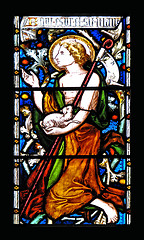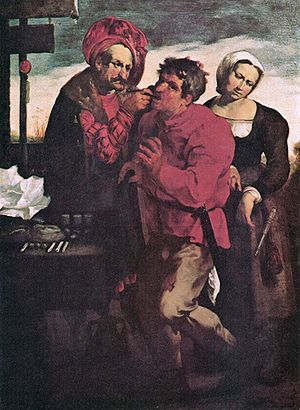The Gospel for January 16, 2011 is from John 1:24-34 and, like the previous week’s Gospel, focuses on Jesus’ baptism. In John’s Gospel, Jesus’ baptism takes the role of the Fourth Joyful Mystery — The Presentation in the Temple. John does not write about Jesus’ birth or childhood but starts with His baptism as an adult. This Gospel shows John the Baptist as the one who presents Jesus to the world through baptism. John understands and accepts God’s special role for him and this Gospel and rosary mystery calls us to also reflect on how God calls us to live.
A few verses earlier in John’s Gospel, the pharisees ask John the Baptist if he is the Messiah, Elijah, or another prophet. Each time John responds, “no.” When pressed on why he baptizes people, John responds, “the reason why I came baptizing with water was that He might be made known to Israel” (John 1:31). John’s mission, or vocation, is to prepare people for Jesus’ coming. God’s plan for John wasn’t an easy one as it called for a life of constant prayer, penance, and fasting. John’s life eventually ended in his arrest and execution. I’m sure many people saw John the Baptist as some crazy person who wondered the desert. After all, how many of us would probably roll our eyes if someone came into town yelling, “repent, repent!” But John knew that preparing people for Jesus’ coming was so important that he dedicated his life to it. I sometimes wonder if John, and many of the saints, had other plans for themselves earlier in their lives that they abandoned because it was not what God asked of them. Maybe John wanted to be a banker, a carpenter, or own a vineyard. But he knew that his passions wouldn’t amount to anything if they did not line up with God’s plans.
Simeon in the Fourth Joyful Mystery is very similar to John the Baptist. Simeon spent his entire life in the temple in Jerusalem waiting and praying for the Messiah to appear. Like John, Simeon was probably ridiculed and dismissed as a fool. And I’m sure Simeon, as a boy, didn’t think that his entire life would be spent in the temple waiting for God to reveal Himself to him. He probably imagined a “normal” life of living in a small village and working in the fields. But that was not God’s plan for him. And like John the Baptist, upon seeing Jesus, Simeon announced how Jesus was “a light for revelation to the Gentiles, and glory for your people Israel.” (Luke 2:32). Both John and Simeon served to announce that God was made man and came into this world to lead us into His kingdom of Heaven.
When you read or hear this Gospel or meditate on the Fourth Joyful Mystery of the rosary, ask yourself:
- Are you living according to God’s plans or your own?
- Are you looking for how Jesus presents himself to you in your life? Do you search for Him in routine prayer, fasting, and meditation?
- Are you patient with God’s plans for you or are you looking for God to give you a “quick fix?”
- Are you open to God’s plans even if they are difficult or run contrary to how you would like to live?
- Do you have the strength to live up to God’s plans for you even if they are at odds with accepted societal practices?
- Are there parts of your life where you live contrary to God’s plan for you?
- What will you do to align your life more with God’s Will?
Related articles
- Why did Jesus bother to be baptized? (insightscoop.typepad.com)
- “Come, and you will see” : Sermon for Epiphnay 2 (drmoose.wordpress.com)
- Called to Testify — A Lectionary Meditation (pastorbobcornwall.blogspot.com)






